
UNICEF - Accompanying for the happiness of Vietnamese children
Latest
 |
| UNICEF - Accompanying for the happiness of Vietnamese children: The Committee on the Rights of the Child, in its Concluding Observations on the 5th and 6th periodic reports of Vietnam, welcomed the various legislative, institutional and policy measures that the country undertakes to implement the Convention. (Photo: UNICEF Viet Nam/Truong Viet Hung) |
Could you please share your comments about the efforts and achievements of Vietnam in taking care and ensuring the rights of children over the past time?
There is no doubt that Vietnam has been a trailblazer in the region and globally, as seen in the country’ early ratification of the Convention on the Rights of the Child and its progressive implementation. The Committee on the Rights of the Child, in its Concluding Observations on the 5th and 6th periodic reports of Vietnam, welcomed the various legislative, institutional and policy measures that the country undertakes to implement the Convention. Vietnam continues to strengthen systems and gender-sensitive approaches that children rely on – health, child protection, nutrition, water, sanitation, clean environment, education and social protection.
| There is no doubt that Vietnam has been a trailblazer in the region and globally, as seen in the country’ early ratification of the Convention on the Rights of the Child and its progressive implementation. |
In recent years, the COVID-19 pandemic has affected every aspect of children’s lives. However, the country has managed to achieve some good results for children. For example, as of December 2022, almost everyone above 12 years old and over 90 per cent of those from 5-11 years old completed primary doses of the COVID-19 vaccine. The national nutrition plan was approved, and water and sanitation services have been strengthened, while the child protection systems and services have also continued to be reinforced through the child protection regulatory framework, child justice and inter-agency cooperation on violence against children (VAC). Inclusive education is another area that has been enhanced, and the digital transformation strategy is a relevant step toward ensuring digital skills for every child. In addition, based on a new comprehensive national study of school-related mental health risk factors, the promotion, prevention and programming of mental health in schools have been improved through trained school health workers and teachers.
So what are the difficulties that Vietnam is facing?
Like all countries, Vietnam is still grappling with the far-reaching socio-economic impacts of the COVID-19 pandemic, which are particularly devastating for the most vulnerable – children with disabilities, ethnic minority children, and those affected by migration, climate change or conflict.
Progress towards achieving the Sustainable Development Goals has slowed down on many fronts, notably routine immunization coverage for children under one year of age. Likewise, progress in reducing violence against children has stalled, with over 72 per cent of children aged 1-14 experiencing violent discipline at home. Acute malnutrition remains a real danger, with roughly 200,000 children suffering every year and only 10 per cent of them receiving appropriate treatment. Only one fifth of ethnic minority households have access to basic water, sanitation, and hygiene services. Pre-school enrolment rate amongst 3-5-year-olds from ethnic groups is only 66 per cent compared to 92 per cent nationwide. The recent report has shown that almost all the children in Vietnam - 99.5 per cent face three or more types of climate shocks, compared to 89 per cent in the region and 73 per cent globally.
These have been reflected in the Concluding Observation of the Committee on the Rights of the Child, which requests Vietnam to pay special attention and take urgent measures to address issues on the right to non-discrimination, violence against children, children deprived of a family environment, education, economic exploitation, including child labour and child justice. It’s important to note that child rights are indivisibility and interdependence and it’s essential that the rights of every child should be realized.
 |
| Anjanette Saguisag, OIC Representative, UNICEF Vietnam. (Photo: TH) |
What are priorities of UNICEF in Vietnam?
UNICEF has been active in Vietnam since 1975 and our programmes aim to promote the respect for, protect and fulfill the rights of all children. With equity at our core, UNICEF advances the inclusion of the most vulnerable children, including those from ethnic minorities. Our current Country Programme of Cooperation contributes to Vietnam’s Socio-economic Development Strategy (2021–2030) and the National Action Plan for Children 2021– 2030, which prioritize equitable social and human development and adaptation to climate change. And in line with our mandate in the Convention, we continue to provide technical advice or assistance to claim-holders and duty-bearers, with special attention to the Concluding Observation of the Committee on the Rights of the Child.
UNICEF continues to work with the Government and other stakeholders in addressing challenges that are putting children’s lives and development at risk. Nutrition is a key priority, and we provide technical support and therapeutic products, while advocating for increased attention and resources –and this involves including therapeutic products in health insurance for children. We continue to support with essential maternal and new-born care, access to clean water and sanitation, social assistance and the protection of every child against violence, abuse and exploitation. In the area of education, key priorities are further improvement of inclusive education and ensuring that every child acquires digital skills, which are essential in today’s world. Through schools, we are also supporting mental well-being promotion, prevention and programming.
With climate-related impacts and disasters on the rise, we are also working on strengthening child-sensitive, climate-resilient social services and capacity for effective disaster-risk reduction and humanitarian responses.
 |
| UNICEF - Accompanying for the happiness of Vietnamese children: Vietnam has made great efforts to monitor children’s well-being and development. (Photo: UNICEF Viet Nam/Truong Viet Hung) |
UNICEF’s support is materialized by providing technical assistance for system strengthening, building national capacity, testing innovative solutions and supporting their scale-up–with a focus on digital transformation, increasing awareness and facilitating social norms change to advance children’s rights.
Partnerships are key to achieving these aims. In addition to cooperation with Government, mass organizations, key stakeholders and development partners, we aim at leveraging the potential of the private sector to advance children’s rights through public-private and shared-value partnerships that promote family-friendly business policies and the protection of young workers.
Vietnam is developing a set of child-related indicators in harmony with international standards to assess children’s well-being. How could UNICEF support Vietnam in this effort?
Smart demand, supply, and use of data help us drive better results for children. When the right data are in the right hands at the right time, decisions can be better informed, more equitable and more likely to protect children’s rights.
Vietnam has made great efforts to monitor children’s well-being and development. To support this endeavour, UNICEF advocated for a more sustainable development goal (SDG) - and child-focused revised Statistical Law by recommending and technically assisting the inclusion of 14 child-focused indicators into the National List of Indicators for regular reporting and monitoring by the government. Notably, these indicators include multidimensional child poverty rate, proportion of population suffering from violence disaggregated by age group, proportion of population having ICT skills, proportion of people aged 5 – 17 years engaged in labour.
UNICEF welcomes the efforts to develop a set of child-related indicators in harmony with international standards to assess children’s well-being. With strong technical expertise and more than 70 years of global experience in gathering data for and about children, UNICEF can assist Vietnam to use internationally recognized definition and calculation method for monitoring and reporting on children-related SDG indicators. Through our guidance and tools, we can support practitioners and decisions-makers to produce and handle data to better serve children.
UNICEF is also recommending a diversification of the data sources and information for official monitoring and reporting, instead of relying solely on government-generated data. This diversification would help to build national data analysis capacity for monitoring the progress of child rights by triangulating governmental data with non-governmental sources. This approach could enhance the richness and depth of evidence available for policymaking and decision-making in the best interest of children in Vietnam.












